|
|
|
Sort Order |
|
|
|
Items / Page
|
|
|
|
|
|
|
| Srl | Item |
| 1 |
ID:
188663
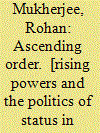

|
|
|
|
|
| Publication |
Cambridge, Cambridge University Press, 2022.
|
| Description |
xvi, 324p.: figures, tableshbk
|
| Series |
Cambridge Studies in International Relations: 160
|
| Standard Number |
9781009186810
|
|
|
|
|
|
|
|
|
|
|
|
Copies: C:1/I:0,R:1,Q:0
Circulation
| Accession# | Call# | Current Location | Status | Policy | Location |
| 060294 | 327.11209/MUK 060294 | Main | On Shelf | Reference books | |
|
|
|
|
| 2 |
ID:
107434
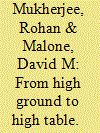

|
|
|
|
|
| Publication |
2011.
|
| Summary/Abstract |
Independent India's multilateral strategy was designed defensively as a means to provide the country with some leeway in an intensely competitive bipolar world. Today, India casts itself as an emerging power intent on exerting the bilateral and multilateral influence that the country's founding leaders had long aspired to. Obsolete frameworks such as nonalignment and developing world leadership have mostly been jettisoned in the process. However, questions remain about India's willingness and capacity to take on global responsibilities to match its global aspirations. This article traces the evolution of India's multilateral approach and examinest is multilateral stance through several prisms: the UN Security Council, the World Trade Organization, global climate change negotiations, and some emerging international groupings of states in which India plays a role. Among our conclusions is that, in India's diplomacy, much depends on domestic factors.
|
|
|
|
|
|
|
|
|
|
|
|
|
|
|
|
| 3 |
ID:
094608
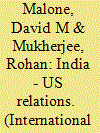

|
|
|
| 4 |
ID:
096001
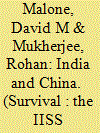

|
|
|
|
|
| Publication |
2010.
|
| Summary/Abstract |
Not much has changed in the rhetoric of Sino-Indian relations since Mao Zedong, speaking in 1951 in honour of the first anniversary of India's constitution, declared that 'excellent friendship' had existed between the two countries 'for thousands of years'. Yet few of the lofty proclamations made by Indian and Chinese leaders over the years truly reflect the reality of relations between the neighbours. It is surprising that two states with such a rich and sometimes fractious history, including a border conflict in 1962, should have what appears to be a largely reactive relationship. But neither has developed a grand strategy with regard to the other. An unshakeable and largely unprofitable preoccupation with the past on the Indian side, and an equally intense preoccupation with domestic consolidation on the Chinese side, have left the relationship under-tended. It might best be seen as one of geostrategic competition qualified by growing commercial cooperation. And there is some asymmetry: China is a more fraught subject in Indian national debates than India is for China. China does not appear to feel threatened in any serious way by India, while India at times displays tremendous insecurity in the face of Chinese economic success and military expansion.
|
|
|
|
|
|
|
|
|
|
|
|
|
|
|
|
| 5 |
ID:
102658


|
|
|
|
|
| Publication |
2011.
|
| Summary/Abstract |
India is fast emerging as an important player in regional and international arenas. However, it continues to be beset by a number of security challenges, both internally and externally. On the assumption that India's foreign policy has evolved in step with its domestic politics, this article briefly surveys the evolution of Indian domestic politics and foreign policy before discussing some of the domestic and international (including regional) security challenges India faces today. The article concludes that although economic diplomacy does at present serve India well in projecting power internationally, achieving great power status in the future will rest on the resolution of key political and security challenges.
|
|
|
|
|
|
|
|
|
|
|
|
|
|
|
|
| 6 |
ID:
158427
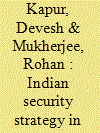

|
|
|
|
|
| Summary/Abstract |
As India assumes an increasingly salient role in world politics, questions of strategy have come to the fore in the study of Indian security. There is growing scholarly interest in Indian strategic thought and practice across a range of areas including conventional military power, nuclear weapons, maritime security, counterinsurgency, counterterrorism, and international regimes. This collection of articles expands the horizon of inquiry in some of these areas by situating Indian strategy in its historical context, by challenging conventional wisdom, and by opening new lines of research. In the following sections, we lay out the contours of what the contributors to this special issue collectively take to mean by strategy and then situate the issue in the literature on Indian strategy. We subsequently provide some over-arching observations on Indian strategy that emerge from the articles collected here and conclude by raising some questions regarding the intellectual and practical primacy of strategy in statecraft today.
|
|
|
|
|
|
|
|
|
|
|
|
|
|
|
|
| 7 |
ID:
158428
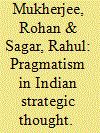

|
|
|
|
|
| Summary/Abstract |
Although contemporary Indian strategic thought is described in terms of various schools, most scholars agree that prior to the end of the Cold War there prevailed a so-called Nehruvian consensus on India’s strategic objectives. This consensus was allegedly idealist, emphasizing autonomy, peaceful co-existence, and Third World anti-imperialist leadership. We argue that this characterization ignores numerous alternative views on Indian strategy that thrived in elite debates outside the uppermost echelons of power. Many of these views were grounded in pragmatism, or a flexible approach to considerations of power and material interest that eschewed dogmatic thinking, be it high moralism or offensive bluster. Through a case study of India’s response to China’s emerging nuclear program following the latter’s first nuclear test in 1964, we highlight the role that pragmatism played in the national debate and the way it shaped the strategic options considered by the elite at the time.
|
|
|
|
|
|
|
|
|
|
|
|
|
|
|
|
|
|
|
|
|